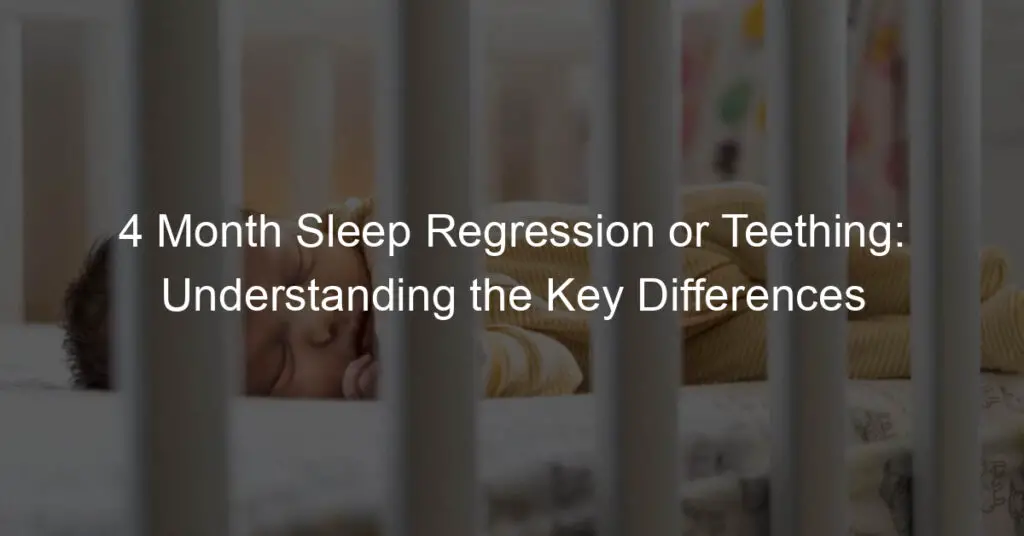As a parent, it’s no secret that sleep challenges can arise when raising a young child.
At around four months old, many babies experience the common phenomenon known as “4 month sleep regression or teething” or exhibit signs of teething. These events can cause disruptions in your little one’s sleep patterns and daily routine, leading to restless nights for both of you.
Comprehending the differences between 4-month sleep regression and teething is crucial in identifying the root cause of your baby’s sleep disturbances.
While sleep regression is characterized by a sudden change in sleeping patterns, teething is a natural developmental process that brings physical discomfort when new teeth break through the gums.
By observing your child’s behavior and symptoms, you will be more equipped to provide the appropriate care and support during these challenging times.
Key Takeaways
- Recognize the differences between 4-month sleep regression and teething to address your baby’s sleep challenges effectively.
- Observe and identify the symptoms your baby displays to determine the root cause of sleep disturbances.
- Consult professional advice and implement strategies to establish good sleep habits and cope with sleep deprivation.
Understanding 4 Month Sleep Regression or Teething

When it comes to sleep, I know that there are several factors that can impact a baby’s ability to sleep soundly, including sleep regression and teething.
As a parent, it’s essential to recognize the signs of sleep regression and determine if there is an underlying teething issue.
At around 4 months, many babies experience a sleep regression, which signifies a disruption in their usual sleep pattern.
My understanding is that this shift in sleep has to do with the baby’s mental and physical development. During this time, incoming teeth can also cause discomfort, causing disruption in sleep.
From my experience, sleep regression is sometimes marked by frequent waking, difficulty falling asleep or staying asleep, and changes in sleep patterns.
Some signs of teething include irritability, drooling, finger gnawing or sucking, and swollen gums.
It’s important to keep in mind that while sleep regression usually lasts for a few weeks, teething can occur periodically for months.
To differentiate between the 4-month sleep regression and teething, I focus on the signs and symptoms.
If the baby’s sleep issues are primarily related to teething, they may also exhibit other symptoms, such as irritability and swollen gums.
When sleep regression is the primary cause, their sleep patterns will be more consistently disrupted.
In my research, I have come across some strategies that may help during both sleep regression and teething.
To help the baby sleep better during teething, consider:
- Offering a cool teething ring or cold washcloth for gnawing
- Gently massaging their gums if they allow it
- Applying a topical numbing product on their gums, as recommended by a healthcare professional.
Managing sleep regression may involve:
- Establishing a consistent bedtime routine with actions like reading and rocking to signal sleep time
- Ensuring that the baby sleeps in a dark, quiet, and comfortable environment
- Avoiding an over-dependence on sleep props
By understanding sleep regression and teething, I am better equipped to navigate my baby’s sleep issues and provide support when necessary.
Identifying 4 Month Sleep Regression

At around 4 months, I noticed a change in my baby’s sleep patterns. Their once peaceful nights turned into frequent night-waking incidents.
They had difficulty falling asleep, even though they seemed tired. Initially, I thought these sleep problems were a temporary phase, but they persisted.
When my baby reached the 4-month mark, I realized that their total sleep time was decreasing, and they were having a hard time resettling themselves during the night.
This sleep issue was something that I had heard about from other parents, and it is commonly called the 4 month sleep regression.
I learned that the primary reason behind this sleep issue is the natural maturation of my baby’s sleep patterns.
As their brain develops, they move from newborn sleep cycles to more adult-like sleep cycles, which involve lighter sleep and deeper sleep phases.
This changing sleep pattern makes it harder for babies to fall back asleep when they wake up during the night.
As a result, my baby had a hard time lulling themselves back to sleep after waking up. They would cry and become increasingly difficult to soothe.
I noticed them struggling more with naps as well, waking up after shorter periods and resisting going back to sleep.
I found that being consistent and providing a soothing sleep environment was essential for helping my baby through this sleep regression.
I made sure to establish a bedtime routine and tried to teach them self-soothing techniques, like using a pacifier or a comforting lovey.
Staying patient and being aware of this common 4-month milestone helped me to remain confident and diligently address my baby’s sleep issues.
Teething and Its Symptoms
As a baby goes through their developmental milestones, teething is one of those stages that can cause discomfort and restlessness.
It’s common for babies to experience teething pain as their teeth begin to emerge, typically around 4 months of age or later.
When teething begins, I may notice several symptoms in my baby.
For example, drool production might increase substantially, resulting in a constant need to wipe my baby’s face or change their bibs.
In addition to excessive drooling, some babies might develop a flushed, rosy look on their cheeks. This redness can be a sign of teething pain and discomfort.
Teething can also cause some babies to rub their faces or tug at their ears. It is essential for me to pay close attention to these signs, as they might also indicate an ear infection.
If rubbing or tugging persists, I should consult a pediatrician to ensure it’s not a more severe issue.
Another indication of teething could be if my baby shows sudden changes in their behavior. They may become fussier, have difficulty sleeping, or even lose interest in their favorite toys or games.
These changes can be challenging for both my baby and me, but understanding teething as the cause can help in addressing the situation.
Establishing a new skill set for managing teething pain will be necessary to help my baby become more comfortable during this stage.
I can try various methods, such as massaging my baby’s gums, offering them cold toys or teething rings, and providing extra cuddles to soothe them.
Recognizing the signs of teething will help me address my baby’s discomfort effectively, ensuring that their teething experience is as bearable as possible.
Impact of Sleep Regression and Teething on Daily Routine

During the 4-month sleep regression or teething phase, I’ve noticed several changes in my daily routine.
Let me share how these milestones have affected various aspects of my day-to-day life.
Firstly, my baby’s bedtime has become unpredictable. Before this phase, we had a consistent bedtime routine that involved baths, massage, feeding, and lullabies.
Now, even after following the same nighttime habits, my little one has trouble settling down due to sleep regression or the discomfort of teething.
This has led to bedtime taking much longer and night awakenings becoming more frequent.
In addition to the bedtime challenges, there’s the matter of feeding. Since my baby isn’t sleeping as well, he tends to get hungrier more often.
On the other hand, teething can cause a decrease in appetite due to the pain in their gums. This imbalance in feeding schedule has forced me to adjust my daily routine as well.
Naptime, which used to be steady and predictable, has also been affected. Just like bedtime, it’s harder for my baby to fall asleep and stay asleep during naps.
As a result, I’ve had to try different strategies to keep him comfortable and eventually settle down for rest.
Shorter and more frequent naps have become common during this period.
The overall sleep routine has required some flexibility as well. With bedtime being more challenging, I’ve had to adjust my evening schedule to accommodate the longer process.
This also means that I may need to put my baby to bed earlier than usual to account for the extra time it takes to settle down.
The 4-month sleep regression and teething have significantly impacted my daily routine as a parent.
The alterations in bedtime, feeding, naps, and sleep routine have required me to adapt and find new strategies to ensure the comfort and well-being of my baby during this difficult phase.
Strategies to Alleviate Sleep Regression and Teething
When my baby is going through a tough stage like 4-month sleep regression or teething, I’ve found several helpful strategies to alleviate their discomfort and help them sleep better.
Firstly, I make sure to provide comfort and reassurance in the form of cuddles, gentle pats, and soothing words. It’s important for the baby to know that I’m there for them during these challenging times.
To help with self-soothing, I give my baby a cold teething ring or a clean, damp washcloth to chew on. The cold sensation can help alleviate their gum pain from teething.
However, I avoid using numbing agents or gels, as they can be potentially harmful to my baby.
Sometimes, a warm bath can work wonders for a fussy sleeper. The warm water will help relax their tense muscles and provide a soothing environment.
After the bath, I wrap my baby in a soft, cozy towel and give them a gentle massage to help them further relax.
In my experience, swaddling has been an incredibly helpful tool to calm an agitated baby.
By wrapping my baby snugly in a soft blanket, they’ll feel secure and comfortable and start to associate the swaddle with sleep time.
However, as they grow and start rolling over, it’s essential to transition from a swaddle to a safer sleep sack or wearable blanket.
It’s crucial to maintain a regular sleep schedule and bedtime routine for my baby. Consistency helps them know what to expect and when it’s time to wind down for sleep.
Lastly, when deemed appropriate and safe, I may use the “cry it out” method, which involves letting my baby cry for brief periods before providing comfort.
This technique helps them learn to self-soothe and eventually fall asleep without constant intervention.
Yet, it’s essential to remember that every baby is different, and what works for one might not work for another.
Employing these strategies and being sensitive to my baby’s needs can help them navigate through the 4-month sleep regression and teething while keeping them as comfortable as possible.
Professional Advice and Methods for Baby Sleep Troubles

As a knowledgeable individual in the field, I recommend speaking to a pediatrician for guidance and professional advice when it comes to tackling baby sleep troubles.
Whether it is a 4-month sleep regression or teething, pediatricians can help identify the cause and provide appropriate expert solutions.
One common approach for managing baby sleep issues is sleep training. The goal of sleep training is to help your baby learn how to self-soothe and fall asleep independently.
Various sleep training methods can be applied to cater to the baby’s needs and temperament, as well as the parent’s comfort level.
For instance, the Cry-It-Out method might be effective for some, while others may prefer the more gentle Fading technique.
It is crucial to choose a sleep training method that aligns with your parenting style and beliefs while considering your baby’s unique characteristics.
In addition to sleep training methods , seeking assistance from a sleep consultant can be another effective way to tackle baby sleep problems.
A sleep consultant, being well-versed with numerous techniques and strategies, can help you create a customized sleep plan for your baby.
This can prove beneficial in addressing any particular sleep challenges you’re facing with your newborn.
Here are a few methods and techniques to ease baby sleep troubles:
- Establish a consistent bedtime routine: This helps your baby recognize sleep cues and develop a sense of predictability, making it easier for them to fall asleep.
- Create a calming sleep environment: Ensuring your baby’s room is dark, quiet, and comfortable can promote better sleep.
- Use white noise machines: White noise machines can help block out disruptive noises and provide a comforting, consistent sound for your baby to sleep.
- Feed and soothe your baby: Make sure your baby is well-fed and comfortable before bedtime to minimize sleep disruptions caused by hunger or discomfort.
It is important to be patient and maintain a consistent approach in helping your baby overcome sleep troubles.
Always remember that every baby is unique, and what works for one may not work for another.
Seeking professional advice and trying various methods can eventually find the most suitable solution for your baby’s sleep challenges.
Understanding and Navigating Sleep Patterns and Circadian Rhythm
When it comes to sleep, I’ve learned that it’s important to understand our natural sleep patterns, sleep schedules, and circadian rhythms. These all play a crucial role in determining how well-rested we feel each day.
In this section, I’ll briefly discuss these concepts and provide some helpful tips for navigating them.
The first thing I’ve learned is that our sleep patterns are composed of multiple sleep cycles. Each cycle consists of different stages that range from light to deep sleep.
Most of us go through several of these cycles each night, and it’s during the deep sleep stages when our body repairs and rejuvenates itself.
In order to get sufficient rest, it’s important that we allow our bodies to go through these complete cycles.
To do this, it’s helpful to establish a consistent sleep schedule. I’ve found that going to bed and waking up at the same time each day helps my body sync up with its natural circadian rhythm, which is essentially my internal clock that regulates when I feel awake or tired.
By doing so, I’ve noticed an improvement in my overall sleep quality, and I’m less likely to experience disruptions like 4-month sleep regression or teething.
Another essential aspect of our circadian rhythm is the influence of external factors, like light and temperature.
I’ve discovered that creating a bedtime environment that is dark, cool, and free of electronic screens can make it much easier for my body to transition to sleep mode.
This is because exposure to light, especially the blue light emitted by screens, can interfere with the production of the sleep hormone melatonin.
Some additional tips that I’ve found helpful for navigating my sleep patterns and circadian rhythm include:
- Avoiding caffeine and heavy meals close to bedtime
- Establishing a relaxing bedtime routine
- Utilizing relaxation techniques like meditation or deep breathing
- Exercising daily, preferably during daylight hours
- Exposing myself to natural light during the day
By understanding and making adjustments to my sleep patterns, schedule, and circadian rhythm, I’ve been more successful in achieving better sleep, allowing me to tackle 4-month sleep regression or teething with greater ease and confidence.
Recognizing and Handling Developmental Changes

As I observe the growth of my baby, I’ve come to notice that developmental milestones and growth spurts play a significant role in sleep disruptions.
One such challenge is the 4-month sleep regression, which can often be confused with teething.
Understanding and managing these changes is vital for both my baby’s development and my own sanity.
I noticed a developmental leap around the four-month mark, which was accompanied by disrupted sleep patterns.
This was mainly due to my baby’s changing sleep cycle and their newfound awareness of the world around them.
It’s essential to stay attentive to these developments and remain patient during this trying time.
During this period, I also observed changes in my baby’s physical growth and mobility. Crawling, for example, is a key developmental milestone that takes place around this time.
Encouraging and supporting their attempts to move around can be vital to healthy development.
In addition to crawling, I noticed that my baby exhibited signs of separation anxiety. Becoming attached to familiar faces and exhibiting anxiety when those faces aren’t around is a common developmental change.
Acknowledging their feelings and offering support can help ease their worries and minimize disruptions to their nighttime sleep routine.
Instead of panicking or becoming frustrated with my baby’s changing behavior, I found it helpful to adapt my parenting strategies accordingly.
Responding to my baby’s needs with a confident and knowledgeable attitude, I was able to better handle these developmental changes and ensure a more stable sleep schedule.
Coping With Sleep Deprivation and Establishing Good Sleep Habits

As a parent, sleep deprivation can quickly become overwhelming.
When your baby is going through the 4-month sleep regression or teething, it’s essential to find ways to cope with sleep deprivation while establishing good sleep habits.
When I’m feeling particularly sleep-deprived, I find it helpful to squeeze in some rest during the day, even if it’s just a short nap.
I also remind myself that it’s okay to ask for help or accept help from friends, family, or even through hired help, getting someone to take care of the baby for a while, so I can get some sleep.
Another important factor is going to bed earlier when possible, ensuring I get ample sleep when I can.
As for establishing good sleep habits, I’ve found that having a consistent bedtime routine is crucial. This may include giving my baby a bath, reading a book, or singing a lullaby.
The routine helps signal to them that it’s time for bed and can make falling asleep easier.
Further, I create a calming sleep environment by making sure the room is dark and at an optimal temperature for their comfort.
It’s essential to understand the difference between my baby being overtired and simply tired. When overtired, they have difficulty falling asleep and may wake up more frequently throughout the night. To combat this, I monitor their tired cues closely, such as rubbing their eyes or yawning, and put them to bed before they reach the overtired stage.
In conclusion, coping with sleep deprivation can be challenging, but by establishing good sleep habits and knowing when my baby is tired or overtired, we can work together to make the 4-month sleep regression or teething period a bit more manageable.
Frequently Asked Questions
How can I differentiate between 4-month sleep regression and teething?
I find it helpful to compare the common symptoms of both situations. 4-month sleep regression usually involves frequent night waking, shorter naps, and increased fussiness at bedtime.
On the other hand, teething may cause irritability, drooling, and a desire to chew on items.
What are the common signs of the 4-month sleep regression?
Some common signs I’ve noticed in my experience include:
- Difficulty in falling asleep
- Frequent waking during the night
- Shorter naps
- Increased fussiness, especially at bedtime
How long does the 4-month sleep regression typically last?
In my experience, the 4-month sleep regression usually lasts for about 2 to 6 weeks. However, this duration may vary depending on individual babies and their specific circumstances.
Can teething affect a baby’s sleep patterns?
Yes, teething can certainly impact a baby’s sleep. As a baby’s teeth begin to erupt, they may experience discomfort, leading to frequent night waking and difficulty in falling asleep.
Are naps also impacted during the 4-month sleep regression?
I’ve observed that naps can be affected during this time as well. Babies may take shorter naps or have difficulty in falling asleep for naps due to the changes in their sleep patterns.
What strategies can help during the 4-month sleep regression?
I suggest a few strategies to help during this time:
- Establish a consistent bedtime routine
- Create a comfortable sleep environment
- Offer comfort and reassurance during wakeful periods
- Practice patience and understanding, as this is a temporary stage in your baby’s development.














